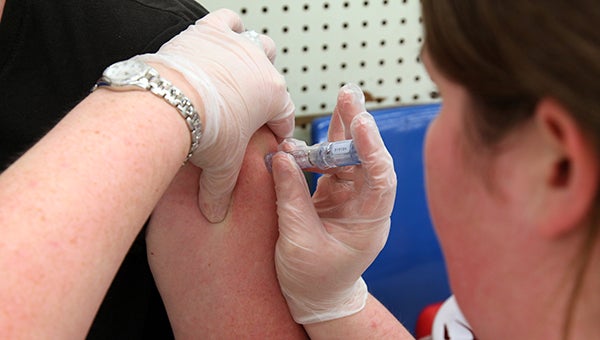First flu case reported, not too late to get vaccinated
Published 12:00 am Sunday, January 17, 2016

- VACCINATED: Pharmacist Nikki Laws gives a flu shot in 2013 at Rite-Aid.
Flu season is coming into its peak, but it could be a mild year if people continue to practice good hygiene and get vaccinated.
The Mississippi State Department of Health reported the first case of influenza in the state of Mississippi for the 2015-2016 flu season on Monday in northeast Mississippi.
“This not only indicates that flu has been detected in the state, but it also serves as a reminder that it is not too late to get your flu shot if you haven’t done so already,” MSDH State Epidemiologist Dr. Thomas Dobbs said in a press release. “The flu shot takes one to two weeks to produce immunity, and flu season usually peaks in January through March in Mississippi.”
MSDH director of communications Liz Sharlot said not all flu cases are brought forward to the MSDH because flu is not an illness that has to be reported. More cases of flu could have been diagnosed without the MSDH being informed.
“We don’t count every single flu case. This is just the first case that was confirmed in our public health laboratory,” Sharlot said.
She said Warren County is among the lower areas of the state for reports of flu-like symptoms. The MSCH looks at flu activity throughout the state each week, she said, through the Influenza-Like Illness Sentinel Surveillance System, where healthcare providers report the percentages of their patients who have symptoms.
“You’re among the lower, not the lowest, but you really aren’t showing high levels of influenza-like illness,” Sharlot said of Warren County.
With that being said she does say it is difficult to predict what the season will bring and low numbers don’t necessarily mean anything for the rest of the flu season.
Sharlot also said flu is a year-round illness that only reaches its peak in winter when it’s cooler and people spend more time together indoors. The circumstances of the time of year dictate how easily the illness will spread among people.
She said it is typical for the flu to make its way through northern states first because they get colder sooner before going through the Midwest and then hitting the South.
“Typically we’re about the last,” Sharlot said.
It’s more likely flu cases will start being confirmed in December and it is slightly late to only see one case in January.
“We typically see cases in December, peak in January, February and through March maybe a little bit in April,” Sharlot said. “The fact that we just confirmed a case in our public health laboratory is definitely a little later than we normally do. We’ll normally get a case in December, but each flu season is unpredictable.”
Sharlot said seeing so few cases at this time could be because of the warmer temperatures this fall and winter and because the flu shot seems to be a good match to this year’s strain of flu.
“We have had a slower start than normal plus the vaccine appears to be a very good match,” she said.
She said it is not too let to get vaccinated. The Warren County Department of Health offers seasonal flu vaccines to anyone as young as 6 months for $30, a flu nasal mist for $35 or a high dose vaccine to people 65 and older for $55. Programs like Vaccines for Children and the Children’s Health Insurance program allow eligible children under 18 to receive a flu vaccine for $10.
“Vaccine is your best protection because it’s not 100 percent affective, but if you did get the flu with the vaccine the symptoms are much, much less than if you have not had a flu shot,” Sharlot said.
She encourages everyone to cover their mouth when they cough and sneeze, to wash their hands frequently and to stay home from school and work when they don’t feel well to prevent the illness from spreading.
“We still don’t know what’s going to happen,” Sharlot said. “So that’s why my advice is…tell your folks to get vaccinated.”
Cold and flu symptoms can be similar to each other and the MSDH’s advice is to get checked out by a doctor sooner rather than later. Early detection is key to kicking the illness faster.
“If you don’t feel well, call your doctor because the earlier we can diagnose it the faster we can get you treatment and the faster you can get well,” Sharlot said.





